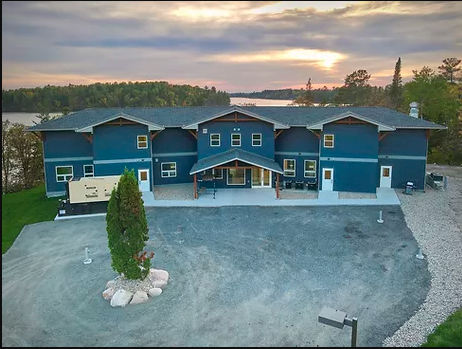WAUZHUSHK ONIGUM NATION, TREATY 3 TERRITORY - At the grand opening, Wauzhushk Onigum Nation Chief Chris Skead, past clients, and guests joined Migisi staff and the board of directors for a barbecue luncheon, ribbon-cutting ceremony and drum performance.
"The process, the time and the work that has brought us to this monumental event have not always been an easy one, especially during a pandemic, but standing here looking up at this beautiful new facility in this location surrounded by water, it has been worth the wait, the struggles and hard work,” said Cheyenne Bunting, executive director, Migisi Drug and Alcohol Treatment Centre. “And I can stand here knowing that for years to come, it will meet the needs of the individuals that enter our program, and we will be able to help so many of our Anishinaabe people who struggle with mental health and addictions."
Back in May, Migisi held a traditional soft opening of the facility with the board of directors and staff before accepting its new clients.
Over the last month and a half, their roster has nearly doubled the size of the previous building.
The Migisi Alcohol and Drug Treatment Centre abide by an enlightening philosophy which is stated on their website, “my difficult journey of life has brought me here to cleanse my body, mind, soul, and spirit. With the guidance of the Creator, I will begin to live and heal in wellness with all creations once again.”
And with the expansion and renovation of the new treatment centre, those who are seeking help overcoming addiction have access to a culturally safe space where community members will get the quality care that meets their needs.
Although Migisi officially opened its doors in July 1989, Migisi’s mission has always been to guide and support the Anishinaabe people holistically.
Located on the lakefront of Matheson Bay on Wauzhushk Onigum First Nation near Kenora, Ont., the Migisi Alcohol and Drug Treatment Centre facility has 14 rooms and is equipped with handicap accessibility.
Migisi's previous building was 509 square metres; however, the new building adds 345.7 square metres, for a total of 854.7 square metres of space.
Purpose-built for Migisi, the renovated facility has several design features that enable staff to better serve clients. Upgrades like doors requiring key cards for access, a designated area to store client files, and staff-only rooms make it easier to perform administrative work efficiently and provide space where employees can decompress. These changes mean that staff can be more fully present when engaging with clients to provide the best possible care.
Migisi is funded by Health and Welfare Canada/National Native Alcohol and Drug Abuse Program.
But in response to Call to Action #22 of the Truth and Reconciliation Final Report, Indigenous Services Canada funded $3,429,202 for the construction and renovation of the new facility, which was provided in fiscal years 2019-20 and 2020-21.
"The act of colonization through displacement, discrimination and systemic racism has caused intergenerational trauma for Indigenous Peoples. Keeping Indigenous care in Indigenous hands is an integral part of our work toward reconciliation, and we are so pleased to support the Migisi Alcohol and Drug Treatment Centre in providing a safe space for Indigenous people facing addiction to recover. The Government of Canada will continue these important investments in traditional Indigenous healing practices," said Patty Hajdu, Minister of Indigenous Services
Migisi runs a four-week drug and alcohol treatment program that is based on traditional teachings and prioritizes culturally appropriate care. In addition to psychological support and counselling, practices such as morning smudges, visits with Elders, drum teachings, sharing circles and sweat lodges support clients in recovery.
The Medicine Wheel and 12 Steps form the basis of Migisi's program, enabling individuals receiving treatment at Migisi to connect their journey in recovery to their lived experiences as Indigenous people.
